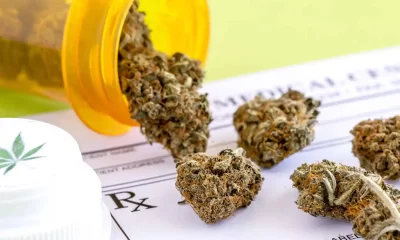Government
Congressional Candidates’ Silence On Cannabis Reform

Most candidates for federal office do not see cannabis as an issue prominent enough to discuss, and deep partisan differences still remain among elected officials.
Cannabis reform has grown in popularity with voters, activists, and state legislators; cannabis is now legal for medical use in 38 states and DC and for adult-use in 19 states and DC. Despite those advances in state level reforms and in the broader conversation nationwide, Congress has failed to pass a major piece of legislation addressing the issue, and many voters and activists wonder why.
One argument is that federal level officials—in the executive branch and in Congress—simply don’t care enough about the issue to address it. To consider this question, I included a coding about cannabis reform in Brookings Primaries Project in 2022. The Brookings Primaries Project examines the publicly stated views—via the websites and social media presence—of all candidates running in U.S. congressional primary races. We coded each candidate on a four-point scale: whether they supported legalization or decriminalization of cannabis, whether they supported medical legalization only, whether their position was complex or indecipherable, and whether they failed to mention the issue at all.
The results provide three general takeaways. First, primary candidates for Congress do not consider the issue important enough to elevate to be included on their website or on social media. Second, on average, candidates who do engage on the issue are at least not harmed by staking out a public position. Third, stark differences exist between Democratic primary candidates for Congress and Republican primary candidates for Congress.
These findings generally reflect a reality that bears out in public opinion polling. While cannabis reform is popular among Americans (68% support in the latest Gallup poll), it is not a salient issue among voters; polling shows that cannabis reform has never jumped into even the top 20 most important issues for voters. That support but lack of salience has a compelling impact on members of Congress and congressional candidates: it gives them the freedom not to engage the issue.
Overall, we coded 2360 candidates running in Democratic and Republican primaries for Congress. As table 1 shows, the vast majority of candidates (81.4%) made no mention of cannabis reform at all on their websites and social media. In fact, clashing against the idea that the popularity of cannabis reform should be pushing legislators to make clear statements of support for reform, 86.4% of candidates either made no mention, staked out an unclear position, or explicitly opposed cannabis reform.
TABLE 1: CANNABIS CAMPAIGN POSITIONS AMONG 2022 CONGRESSIONAL PRIMARY CANDIDATES

Those publicly stated positions were not uniform across parties however. As Table 2 shows, a pro-cannabis reform position was much more popular among Democratic candidates (30.5%) than among Republican candidates (2.0%). This demonstrates clear differences between the parties that are also reflected in rates of opposition to cannabis. Although more than 90% of Republican candidates failed to mention cannabis at all, 4.1% of them staked out an anti-cannabis reform position. On the other hand, only three of the 962 Democratic primary candidates (0.3%) opposed reform.
TABLE 2: 2022 CONGRESSIONAL PRIMARY CANDIDATES’ CANNABIS POSITIONS BY PARTY

It is true in public polling that differences exist between Democratic voters’ support (83%) for cannabis reform and Republican voters’ support (50%). However, the polling data above show that there is still a clear disconnect between what voters want and what candidates for office are willing to say about the issue. For example, only 2% of Republican primary candidates supported cannabis reform, despite 50% of GOP voters endorsing that policy. And even while a third of Democratic primary candidates support legalization, that pales in comparison to the more than 80% support Gallup finds among Democrats.
Another way to look at these data are to divide states up according to whether they are running for Congress in the 19 states that are fully legal, the 19 states that have medical only, or the 12 states that have neither. As table 3 shows, the legal status of cannabis in a state has effectively no impact on whether a candidate engages on the issue: between 80.2% and 82.9% of candidates in each type of state are silent on it. Candidates in fully legal states (15.9%) are more likely to support cannabis legalization than in medical only (12.2%) or non-legal states (11.7%).
TABLE 3: 2022 CONGRESSIONAL PRIMARY CANDIDATES’ CANNABIS POSITIONS BY STATE TYPE

Similarly, as Table 4 shows, Democrats in fully legal states are the most supportive of cannabis reform, with more than a third of candidates in primaries voicing support. The same was not true of Republican candidates. Republicans in cannabis legal states were less likely to support cannabis reform than they were in medical only states and non-legal states. What’s more, this was not an artifact of fewer Republicans running in fully legal states—there were more GOP primary candidates in legal states than in either medical only or non-legal states.
TABLE 4: 2022 CONGRESSIONAL PRIMARY CANDIDATES’ CANNABIS POSITIONS BY STATE TYPE AND PARTY

The data also allow for an analysis of a) whether cannabis could be viewed as more than a fringe issue and b) whether taking a position on cannabis potentially harms candidates’ chances of winning. The latter point is of particular interest given the vestiges of drug-war era indoctrination among elected officials that a pro-drug reform position is politically toxic.
To do this, I examine the difference in cannabis position taking among candidates who went on to win their primaries versus those who lost. As Table 5 shows, among all candidates, winners were much more likely to address the cannabis issue (33.3%) than were congressional primary losers (9.5%). Those figures include winning candidates who were more likely to oppose cannabis legalization (6.0%) than were losing candidates (0.5%). However, winning candidates were also significantly more likely to support cannabis reform (22.2%) than were losing candidates (8.4%).
TABLE 5: 2022 CONGRESSIONAL PRIMARY CANDIDATES’ CANNABIS POSITIONS AMONG WINNERS AND LOSERS

There are a few key takeaways from these findings. First, while cannabis may not be a popular issue for congressional primary candidates to address publicly, it is not a fringe issue only discussed by unserious candidates. Successful primary candidates are addressing the issue significantly more than losing candidates.
Second, successful primary candidates do not see cannabis reform taking as a political liability—like it once was—as more than one-fifth of successful candidates voiced support for that position on their website and/or through social media.
Third, despite gains in cannabis reform in a variety of areas, public opposition to cannabis reform is still embraced successfully by some candidates.
Fourth, the analysis cannot tell us whether support or opposition to cannabis reform helps candidates, however, we can say that in many races, it does not harm those candidates, given the levels of success among cannabis position-taking candidates.
The data also show that cannabis position taking differences by winners and losers is driven largely by party. As Table 6 shows, of the 54 winning primary candidates who publicly opposed cannabis, 94.4% were Republicans. Conversely, of the 199 winning candidates who supported cannabis reform, 95.0% were Democrats. In fact, among all Democratic primary candidates, 64.5% of those taking a pro-cannabis position won their primary, and only 55.1% of winning Democratic candidates opted not to take a position on the issue. For Republicans, 78.1% of all winning candidates opted not to discuss cannabis in any context.
TABLE 6: 2022 CONGRESSIONAL PRIMARY CANDIDATES’ CANNABIS POSITIONS AMONG WINNERS AND LOSERS, BY PARTY

It is clear that among all candidates, all Democrats, and all Republicans, taking no public position on cannabis was the most popular strategy during the 2022 congressional primaries. However, among candidates who chose to take a clear position on cannabis, Republicans were more likely to oppose legalization than support it, and the reverse is true for Democratic primary candidates who took a position on cannabis.
In sum, cannabis as a political issue has risen in importance over the past 25 years. As state legislatures and voters via referenda have enacted changes to cannabis laws, the issue has become more popular even in the halls of Congress.
However, cannabis reform advocates’ frequent stupefaction at the lack of progress at the federal level bumps up against a stark reality. Most candidates for federal office do not see cannabis as an issue prominent enough to discuss, and deep partisan differences still remain among elected officials, even as support for cannabis in the general public has exploded in recent years. And the true motivator for a member of Congress to take or change a position—whether voters hold their feet to the fire over an issue—has not yet become a reality in the vast majority of Congressional races across the United States.
Source: https://thefreshtoast.com/marijuana-legislation/congressional-candidates-silence-on-cannabis-reform/
Business
New Mexico cannabis operator fined, loses license for alleged BioTrack fraud

New Mexico regulators fined a cannabis operator nearly $300,000 and revoked its license after the company allegedly created fake reports in the state’s traceability software.
The New Mexico Cannabis Control Division (CCD) accused marijuana manufacturer and retailer Golden Roots of 11 violations, according to Albuquerque Business First.
Golden Roots operates the The Cannabis Revolution Dispensary.
The majority of the violations are related to the Albuquerque company’s improper use of BioTrack, which has been New Mexico’s track-and-trace vendor since 2015.
The CCD alleges Golden Roots reported marijuana production only two months after it had received its vertically integrated license, according to Albuquerque Business First.
Because cannabis takes longer than two months to be cultivated, the CCD was suspicious of the report.
After inspecting the company’s premises, the CCD alleged Golden Roots reported cultivation, transportation and sales in BioTrack but wasn’t able to provide officers who inspected the site evidence that the operator was cultivating cannabis.
In April, the CCD revoked Golden Roots’ license and issued a $10,000 fine, according to the news outlet.
The company requested a hearing, which the regulator scheduled for Sept. 1.
At the hearing, the CCD testified that the company’s dried-cannabis weights in BioTrack were suspicious because they didn’t seem to accurately reflect how much weight marijuana loses as it dries.
Company employees also poorly accounted for why they were making adjustments in the system of up to 24 pounds of cannabis, making comments such as “bad” or “mistake” in the software, Albuquerque Business First reported.
Golden Roots was fined $298,972.05 – the amount regulators allege the company made selling products that weren’t properly accounted for in BioTrack.
The CCD has been cracking down on cannabis operators accused of selling products procured from out-of-state or not grown legally:
- Regulators alleged in August that Albuquerque dispensary Sawmill Sweet Leaf sold out-of-state products and didn’t have a license for extraction.
- Paradise Exotics Distro lost its license in July after regulators alleged the company sold products made in California.
Golden Roots was the first alleged rulebreaker in New Mexico to be asked to pay a large fine.
Source: https://mjbizdaily.com/new-mexico-cannabis-operator-fined-loses-license-for-alleged-biotrack-fraud/
Business
Marijuana companies suing US attorney general in federal prohibition challenge

Four marijuana companies, including a multistate operator, have filed a lawsuit against U.S. Attorney General Merrick Garland in which they allege the federal MJ prohibition under the Controlled Substances Act is no longer constitutional.
According to the complaint, filed Thursday in U.S. District Court in Massachusetts, retailer Canna Provisions, Treevit delivery service CEO Gyasi Sellers, cultivator Wiseacre Farm and MSO Verano Holdings Corp. are all harmed by “the federal government’s unconstitutional ban on cultivating, manufacturing, distributing, or possessing intrastate marijuana.”
Verano is headquartered in Chicago but has operations in Massachusetts; the other three operators are based in Massachusetts.
The lawsuit seeks a ruling that the “Controlled Substances Act is unconstitutional as applied to the intrastate cultivation, manufacture, possession, and distribution of marijuana pursuant to state law.”
The companies want the case to go before the U.S. Supreme Court.
They hired prominent law firm Boies Schiller Flexner to represent them.
The New York-based firm’s principal is David Boies, whose former clients include Microsoft, former presidential candidate Al Gore and Elizabeth Holmes’ disgraced startup Theranos.
Similar challenges to the federal Controlled Substances Act (CSA) have failed.
One such challenge led to a landmark Supreme Court decision in 2005.
In Gonzalez vs. Raich, the highest court in the United States ruled in a 6-3 decision that the commerce clause of the U.S. Constitution gave Congress the power to outlaw marijuana federally, even though state laws allow the cultivation and sale of cannabis.
In the 18 years since that ruling, 23 states and the District of Columbia have legalized adult-use marijuana and the federal government has allowed a multibillion-dollar cannabis industry to thrive.
Since both Congress and the U.S. Department of Justice, currently headed by Garland, have declined to intervene in state-licensed marijuana markets, the key facts that led to the Supreme Court’s 2005 ruling “no longer apply,” Boies said in a statement Thursday.
“The Supreme Court has since made clear that the federal government lacks the authority to regulate purely intrastate commerce,” Boies said.
“Moreover, the facts on which those precedents are based are no longer true.”
Verano President Darren Weiss said in a statement the company is “prepared to bring this case all the way to the Supreme Court in order to align federal law with how Congress has acted for years.”
While the Biden administration’s push to reschedule marijuana would help solve marijuana operators’ federal tax woes, neither rescheduling nor modest Congressional reforms such as the SAFER Banking Act “solve the fundamental issue,” Weiss added.
“The application of the CSA to lawful state-run cannabis business is an unconstitutional overreach on state sovereignty that has led to decades of harm, failed businesses, lost jobs, and unsafe working conditions.”
Business
Alabama to make another attempt Dec. 1 to award medical cannabis licenses

Alabama regulators are targeting Dec. 1 to award the first batch of medical cannabis business licenses after the agency’s first two attempts were scrapped because of scoring errors and litigation.
The first licenses will be awarded to individual cultivators, delivery providers, processors, dispensaries and state testing labs, according to the Alabama Medical Cannabis Commission (AMCC).
Then, on Dec. 12, the AMCC will award licenses for vertically integrated operations, a designation set primarily for multistate operators.
Licenses are expected to be handed out 28 days after they have been awarded, so MMJ production could begin in early January, according to the Alabama Daily News.
That means MMJ products could be available for patients around early March, an AMCC spokesperson told the media outlet.
Regulators initially awarded 21 business licenses in June, only to void them after applicants alleged inconsistencies with how the applications were scored.
Then, in August, the state awarded 24 different licenses – 19 went to June recipients – only to reverse themselves again and scratch those licenses after spurned applicants filed lawsuits.
A state judge dismissed a lawsuit filed by Chicago-based MSO Verano Holdings Corp., but another lawsuit is pending.
Source: https://mjbizdaily.com/alabama-plans-to-award-medical-cannabis-licenses-dec-1/
-

 Business2 years ago
Business2 years agoPot Odor Does Not Justify Probable Cause for Vehicle Searches, Minnesota Court Affirms
-

 Business2 years ago
Business2 years agoNew Mexico cannabis operator fined, loses license for alleged BioTrack fraud
-

 Business2 years ago
Business2 years agoAlabama to make another attempt Dec. 1 to award medical cannabis licenses
-

 Business2 years ago
Business2 years agoWashington State Pays Out $9.4 Million in Refunds Relating to Drug Convictions
-

 Business2 years ago
Business2 years agoMarijuana companies suing US attorney general in federal prohibition challenge
-

 Business2 years ago
Business2 years agoLegal Marijuana Handed A Nothing Burger From NY State
-

 Business2 years ago
Business2 years agoCan Cannabis Help Seasonal Depression
-

 Blogs2 years ago
Blogs2 years agoCannabis Art Is Flourishing On Etsy













